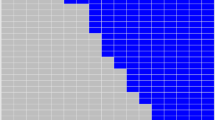Conclusion
This study finds that one of the most important determinants of election outcomes in gubernatorial elections is the voter's familiarity with the candidates. When an incumbent governor seeks re-election, his party's share of the vote increases by about 7.3 percentage points, ceteris paribus. Likewise, when a former candidate represents the opposition party, the incumbent party's share of the vote decreases by about three percentage points, ceteris paribus. The electoral history of the state also has a significant effect on the share of the vote received by the incumbent party.
The major finding of this study is that state economic conditions exert only a weak influence on the outcome of gubernatorial elections. Assuming that voters are rational, a major implication of this finding is that voters do not view a governor as being able to substantially influence a state's economy. If, during a gubernatorial campaign, voters view the candidates as having little or no control over the state economy they will evaluate candidates on the basis of non-economic positions.
The results of this study seem to imply that the outcomes of gub ernatorial elections are determined primarily by non-economic factors. Factors such as candidate personality and positions on a wide variety of non-economic issues that voters deem important appear to be the major determinants of gubernatorial election outcomes.
Similar content being viewed by others
References
Adams, J.D. and Kenny, L. (1989). The retention of state governors. Public Choice 62 (July): 1–13.
Arcelus, F. and Meltzer, A.H. (1975). The effect of aggregate economic variables on congressional elections. The American Political Science Review 69 (December): 1232–1239.
Archer, K. (1987). A simultaneous equation model of Canadian voting behaviour. Canadian Journal of Political Science 20 (September): 553–572.
Archer, K. and Johnson, Marquis (1988). Inflation, unemployment, and Canadian federal voting behavior. Canadian Journal of Political Science 21 (September): 569–584.
Chubb, J.E. (1988). Institutions, the economy, and the dynamics of state elections. The American Political Science Review 82 (March): 133–154.
Erikson, R.S. (1990). Economic conditions and the congressional vote: A review of the macrolevel evidence. American Journal of Political Science 34 (May): 373–399.
Fair, R.C. (1978). The effect of economic events on votes for the president. The Review of Economics and Statistics 60 (May): 159–173.
Galeotti, G. and Forcina, A. (1989). Political loyalties and the economy: The U.S. case. The Review of Economics and Statistics 71 (August): 511–517.
Happy, J.R. (1986). Voter sensitivity to economic conditions: A Canadian-American comparison. Comparative Politics 54 (October): 45–56.
Jacobson, G.C. (1990). Does the economy matter in midterm elections? American Journal of Political Science 34 (May): 400–404.
Kenski, H.C. (1977). The impact of economic conditions on presidential popularity. The Journal of Politics 39 (August): 764–773.
Kramer, G.H. (1971). Short-term fluctuations in U.S. voting behavior, 1896–1964. The American Political Science Review 65 (March): 131–143.
Lewis-Beck, M.S. (1986). Comparative economic voting: Britain, France, Germany, Italy. American Journal of Political Science 30 (May): 314–346.
Monroe, K.R. (1979). Econometric analysis of electoral behavior: A critical review. Political Behavior 1 (Summer): 137–173.
Norpoth, H. and Yantek, T. (1983). Macroeconomic conditions and fluctuations of presidential popularity: The question of lagged effects. American Journal of Political Science 27 (November): 785–807.
Peltzman, S. (1987). Economic conditions and gubernatorial elections. The American Economic Review 77 (May): 293–297.
Rees, A., Kaufman, H., Eldersveld, S.J. and Freidel, F. (1962). The effect of economic conditions on congressional elections: 1946–1958. The Review of Economics and Statistics 44: 458–465.
Scammon, R.M. and McGillivary, A.V. (Ed.) (1989). America votes: A handbook of contemporary American election statistics. Washington, DC: Elections Research Center.
Stein, R.M. (1990). Economic voting for governor and U.S. senator: The electoral consequences of federalism. Journal of Politics 52 (February): 29–53.
Stigler, G.J. (1973). General economic conditions and national elections. The American Economic Review 63 (May): 160–167.
Tufte, E.R. (1975). Determinants of the outcomes of midterm congressional elections. The American Political Science Review 69 (September): 812–826.
Author information
Authors and Affiliations
Rights and permissions
About this article
Cite this article
Levernier, W. The effect of relative economic performance on the outcome of gubernational elections. Public Choice 74, 181–190 (1992). https://doi.org/10.1007/BF00140766
Received:
Accepted:
Issue Date:
DOI: https://doi.org/10.1007/BF00140766




